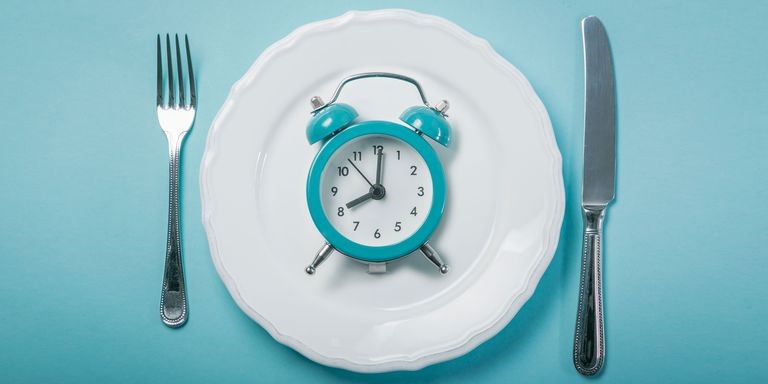Get the facts about the popular weight-loss method.
By Tehrene Firman
If eating is #life, intermittent fasting might not be for you. Instead of waking up and eating breakfast, grabbing lunch around noon, then dinner after work, your schedule is a little — OK, a lot — more strict and your calorie intake is lacking. But, to some people, the weird schedule seems to be worth it.
From benefits like losing weight to feeling more energized, this diet definitely has a giant results-driven, science-backed fan club. Here’s what you should know.
What is intermittent fasting?
When you’re intermittent fasting, your eating schedule basically revolves around a cycle of feeding and fasting, says Toronto-based nutritionist Abby Langer, RD. Some people do a whole-day fast, others choose alternate-day fasting, and some simply do time-restricted eating.
If you choose to do whole-day fasting, you’ll eat less than 500 calories for two consecutive days, then on the other five days, you eat whatever you want in a given week. Alternate-day fasting — or 5:2 — involves eating 500 calories the first day, whatever you want the next day, 500 the next, and so on. And for the last method, you do a bit of fasting every day, only eating between a certain time period — like 12 p.m. to 8 p.m — with no calorie restrictions.
What are the benefits?
For the most part, intermittent fasting has a pretty standard concept: eating less. And avoiding all those excess calories can do your body good in more ways than one.
The most talked-about benefit is weight loss, which simply comes down to science: “It works because the net caloric intake is less than what a person would eat over the course of seven normal-eating days. If you’re cutting out calories, you’re probably going to lose weight,” Langer says. “It may also be an easier way to lose weight rather than, say, a straight low-calorie diet or other diets, such as the ketogenic diet. It all depends on the person.”
As for the other perks, one study found intermittent fasting can help improve your total cholesterol and triglyceride levels, another found it’s just as effective at helping you have a healthy body composition as calorie restriction, and there’s also a possibility that it could help reduce the risk of cancer, slow aging, boost the immune system, and reduce inflammation, says Harvard Medical School, but more research still needs to be done.
Are there any drawbacks?
While there are plenty of benefits, there are also some drawbacks to be aware of: “It can be extremely triggering for people who have a tendency toward — or a history of — eating disorders. It’s also somewhat inconvenient if you travel a lot or go out a lot for dinner. 500 calories is not a lot of food,” Langer says. “Lastly, some people may find themselves eating more on the days following a fast to make up for the food they didn’t get the day before. That can completely sabotage any progress that they’d make with this diet.”
Ready to give intermittent fasting a try?
If you want to give intermittent fasting a try, Langer recommends going with the method that works best for you: “One legitimate method is fasting 18 hours a day and eating for 6. Or if 5:2 works, then go with that. Just don’t binge-eat — or even overeat — on the ‘normal eating’ days.”
While some find the diet sustainable in the long-term, others — Langer included, who wrote about her personal experience — definitely do not. Whether you end up trying intermittent fasting or not, she just wants people to keep one thing in mind: “No one diet works for everyone, and in most cases, just eating healthy and moving more is the best plan.”

